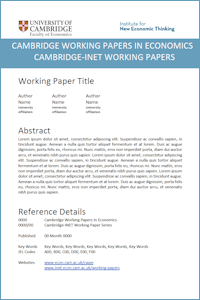
Corsetti, G., Mavroeidi, E., Thwaites, G. and Wolf, M.
Step away from the zero lower bound: Small open economies in a world of secular stagnation
WP Number: 1611
Abstract: We study how small open economies can escape from deflation and unemployment in a situation where the world economy is permanently depressed. Building on the framework of Eggertsson et al. (2016), we show that the transition to full employment and at-target inflation requires real and nominal depreciation of the exchange rate. However, because of adverse income and valuation effects from real depreciation, the escape has a beggar thy self effect, that may end up lowering welfare while eliminating underemployment. We show that as long as the economy remains financially open, domestic asset supply policies or reducing the effective lower bound on policy rates may be ineffective or even counterproductive. However, closing domestic capital markets does not necessarily enhance the monetary authorities' ability to rescue the economy from stagnation.
Keywords: capital controls, optimal policy, Secular Stagnation, Small open economy, zero lower bound
JEL Codes: F41 E62
Author links: Giancarlo Corsetti
PDF: wp1611.pdf 
Open Access Link: 10.17863/CAM.21780
Published Version of Paper: Step away from the zero lower bound: small open economies in a world of secular stagnation, Corsetti, G., Mavroeidi, E., Thwaites, G. and Wolf, M., Journal of International Economics (2019)
